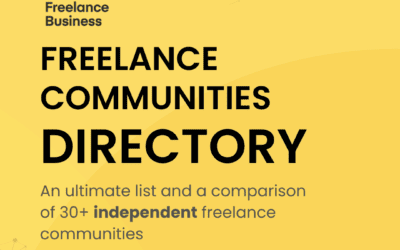Self-employment
Let’s clear some fog around this term first. Simply put, self-employment is when you work for yourself, instead of an employer, and you don’t earn a fixed salary, but get your income through the profits you make.
There are many types of self-employment, with the most popular being freelancing, entrepreneurship, sole trading, and more. Let’s have a look.
Sole trader
If you decided to run your own business, you’ll either register yourself as a sole trader or form a limited company. Being a sole trader makes sense for smaller businesses, as it is usually easier to set up. This means you get to keep the profits from your business (after taxes of course), but also cover all the costs and losses.
A partnership is very similar, only it involves two or more people.
Limited Company Owner
If you want to step up from being a sole trader, then you’ll usually form a limited company. It functions as a separate legal entity, with shares being divided between the owners. It also offers you protection if you acquire financial debt, and you can pay fewer taxes, but requires more legal paperwork to get through.
Freelancer
A freelancer is someone who doesn’t have fixed employment but rather works on flexible projects. Freelancers usually work for one or more clients at once, on an hourly or daily basis, while working from home (or coworking space). Some freelancers have a full-time or part-time jobs and work on freelance projects in their spare time.
Freelancers are in charge of finding their own clients and negotiating their own pay. They need to be aware of the time and effort they’ll spend on a project, as well as motivate themselves to do the job without a manager or a team helping them. This requires a great deal of determination and discipline, as well as negotiating and management skills. To see what skills you’ll need to be a successful freelancer, check our article.
Being a freelancer is common in the creative, media, and marketing industries.
Contractor
A contractor is similar to a freelancer, but with a few differences – they usually work for one client at a time, full-time or for the length of a project, and usually work at the clients’ office.
It is more common in the IT industry, as well as in engineering and construction, where offering hands-on support is often required.
Entrepreneurship
While anyone who starts their own business can be seen as an entrepreneur, the modern meaning of the term now focuses on innovation and automation. Usually, entrepreneurs focus on an innovative idea or tap into a new market, while making high-risk decisions, which often come with financial risks. This is a contrast to small business owners, who prefer to take small and calculated risks and like to keep their business grounded in existing practice.
Entrepreneurs are looking to break new ground and turn an innovative idea into a venture brimming with potential, which can eventually be sold to a big company. They often focus on creating systems for automation and try to delegate their tasks, aiming to get to the point where their businesses will generate profit without their direct involvement. In other words, if you can leave your business alone and it still makes money, you are a successful entrepreneur!
Solopreneur
As you can guess, a solopreneur is quite similar to an entrepreneur, with the difference that they do not plan to add extra staff to their venture.
Entrepreneurs have a more managerial mindset, where they can lead people and share a vision, while solopreneurs like to get their hands dirty and be in control of as many aspects of their business as possible. While entrepreneurs are more likely to go out and promote their business, making connections and expanding their network, solopreneurs prefer to spend the majority of their time working on their business.
It’s not that those aspects aren’t important to a solopreneur, it’s that they prefer following their own vision and making their own choices, instead of complying with external influences.
Digital nomad
A digital nomad can sound like a fancy term for a remote worker, but with more and more companies embracing remote work, it is no longer an exotic term, but a chance to free yourself from the 9 to 5 and embrace the life you’ve always dreamed of.
Simply put, digital nomads are people who work remotely while traveling: this can include relocating to a new country, spending periods of time in different places, or anything in between. Digital nomads either work remote jobs (which can be found on job boards like WeWorkRemotely) or do freelancing, both of which allow them to not be tied to an office or a specific location. As long as you have access to an internet connection in a hotel or a café or a public library, you should have everything you need to do your work while ticking off places to visit on your list. While all this moving around can sound like a hassle to some, for others, the reality of being a digital nomad can be a dream come true.
Know the difference
Wherever your self-employed journey takes you, knowing the differences between the various types of work you can do will make it easier to self-identify, and it will make it clear for people visiting your website or LinkedIn to understand what you do.




